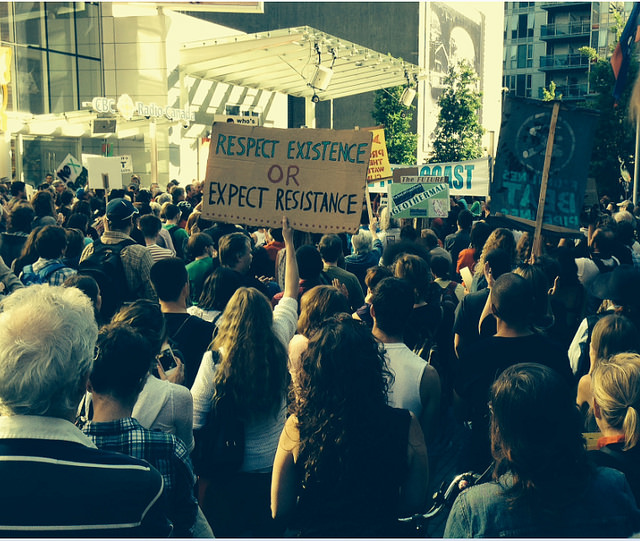Please help rabble.ca support democratic movements working to stop dangerous projects like Northern Gateway. Become a monthly supporter.
The Harper government has approved the Northern Gateway pipeline.
In a statement released this week, natural resources minister Greg Rickford says, “After carefully reviewing the [Joint review Panel] report, the Government accepts the independent Panel’s recommendation to impose 209 conditions on Northern Gateway Pipelines’ proposal. …Consultations with Aboriginal communities are required under many of the 209 conditions that have been established and as part of the process for regulatory authorizations and permits. …The National Energy Board will now issue Certificates of Public Convenience and Necessity.”
The Toronto Star reports, “But when shovels might go into the ground is unclear. Enbridge has not said how long it plans to hold off on construction while it tries to improve public acceptance of the pipeline.” But just eight months ago, Enbridge senior vice-president Vern Yu said, “We expect that there would be some appeals to [federal approval of the pipeline] and that would take us into early 2015 and at that point we would be able to start construction, which would allow for somewhere around a 2018 in-service date.”
In its rather bland announcement, the Harper government failed to explain how approval of the pipeline with the condition of “consultations with Aboriginal communities” can co-exist with the reality that more than 130 First Nations have explicitly rejected the pipeline or the multiple court challenges by First Nations against it. Harper’s decision is clearly inconsistent with the reality of First Nation opposition and Mr. Yu’s comments make it apparent that regardless of this Enbridge intends to start construction on the pipeline early next year.
It is also notable that while Harper chided U.S. President Barack Obama by describing approval of the Keystone XL as a “complete no-brainer,” Harper himself is virtually invisible in this week’s announcement. In fact, the decision was made public through a media release issued by his minister a full six months after the NEB recommendation and on the last day of the government’s own deadline to make their decision. Given Harper has boasted about making Canada an “energy superpower,” why has he not taken centre stage on this major step?
One likely reason is this. A recent Bloomberg-Nanos poll found that 34 percent of British Columbians wanted Harper to reject the pipeline, while another 33 per cent wanted it delayed for further review. And notably 47 per cent of respondents said they would be less likely to vote for Harper if he approves the pipeline, with 19 per cent of those indicating they had supported the Conservatives in the 2011 election. Given the Conservatives hold 21 of the 36 ridings in British Columbia now they need to hold those seats to keep their majority in the federal election now just 18 months away.
In the coming months we will see court challenges, protests and maybe even a provincial referendum on this issue. If those avenues fail, Enbridge will then face additional opposition when they try to put their shovels in the ground and start the construction of the pipeline. More than 22,000 people have already signed on to stand with the Yinka Dene Alliance “with your voice, in the streets, or on the land. Whatever it takes, we will stop this project from ever being built, together.”
With this level of First Nations and community resistance, with the New Democrats, Liberals and Greens all saying that they reject the Northern Gateway pipeline, and with critical United Nations climate talks scheduled to take place in November 2015, there is every indication that the pipeline could be a ballot box issue when people across the country go to vote on October 19, 2015.
Council of Canadians chairperson Maude Barlow says, “Stopping the Northern Gateway pipeline is one of the most important fights we have right now. If we allow Northern Gateway to go ahead, it will mean a massive expansion of the tar sands, more harm to the land, water and climate, and yet another delay for the clean energy future we need. First Nations are opposed to Northern Gateway. They are the rightful stewards of their lands and should be the ones to decide if and how they are developed. The Council of Canadians will stand with them in the coming battles to stop this pipeline.”




